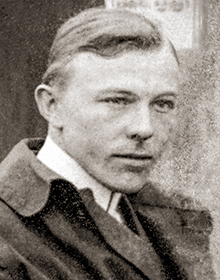Max Gerlach | |
|---|---|
 Surveillance photograph of bootlegger Max Gerlach clandestinely taken on July 8, 1915, by the New York City Police Department | |
| Born | Max Stork Gerlach October 12, 1885[1] |
| Died | October 18, 1958 (aged 73)[2] New York City, U.S. |
| Resting place | Long Island National Cemetery[2] |
| Nationality | German-American[a] |
| Occupation | Bootlegger |
Max von Gerlach (born Max Stork Gerlach; October 12, 1885 – October 18, 1958) was a German-born American bootlegger and an acquaintance of American writer F. Scott Fitzgerald.[4][5] After serving as an officer in the American Expeditionary Force during World War I,[6] Gerlach became a gentleman bootlegger who operated speakeasies on behalf of gambler Arnold Rothstein in New York City.[7]
Flaunting his newfound wealth as a bootlegger in New York, Gerlach threw lavish parties,[8] never wore the same shirt twice,[9] used the phrase "old sport",[4] claimed to be educated at Oxford University,[10] and fostered outlandish myths about himself, including that he was a relation of the German Kaiser.[11] Many of these details about Gerlach inspired Fitzgerald's creation of Jay Gatsby, the titular character of his novel The Great Gatsby.[12]
With the end of prohibition and the onset of the Great Depression in the early 1930s, Gerlach lost his immense wealth.[13] Living in reduced circumstances, he attempted suicide by shooting himself in the head in 1939.[13] Blinded after his suicide attempt, he lived as a helpless invalid for many years.[2] Gerlach died on October 18, 1958, at Bellevue Hospital in New York City.[2] He was buried in a pine casket at Long Island National Cemetery.[2]
- ^ a b Kruse 2014, p. 19.
- ^ a b c d e Kruse 2014, p. 26.
- ^ Kruse 2014, pp. 31, 34.
- ^ a b Bruccoli 2002, p. 178.
- ^ Kruse 2014, pp. 13–14.
- ^ Kruse 2002, pp. 53–54, 47–48, 63–64.
- ^ Sargeant 2022.
- ^ Kruse 2014, p. 15.
- ^ Kruse 2002, p. 47.
- ^ Kruse 2014, pp. 38–39, 63–64.
- ^ Kruse 2002, p. 60.
- ^ Kruse 2002, pp. 45–83; Bruccoli 2002, p. 178; Kruse 2014, pp. 19, 26.
- ^ a b Bruccoli 2002, p. 178; Kruse 2002, pp. 47–48; Kruse 2014, p. 15
Cite error: There are <ref group=lower-alpha> tags or {{efn}} templates on this page, but the references will not show without a {{reflist|group=lower-alpha}} template or {{notelist}} template (see the help page).